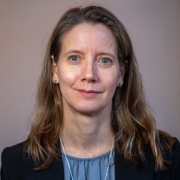Amelie Eriksson Karlström will speak at the Scheele symposium
2023-06-13
How does your research relate to Prof. Shultz’s scientific work?
– I have always had an interest in research bridging chemistry and biology. During my scientific career I have been involved in several projects related to Prof. Peter Schultz’ work, for example I have worked with combinatorial chemistry, directed evolution, and catalytic antibodies. I have used the tRNA suppressor method, developed by Prof. Schultz, for incorporation of unnatural amino acids in proteins in several projects – it works very well and we have found the expanded genetic code to be very useful for our applications.
Can you explain the potential applications and impact of your research for drug discovery/drug development?
– The main objective of my current research is to develop targeted cancer therapy using small, engineered scaffold proteins or antibody fragments for delivery of cytotoxic radionuclides or other payloads. We are investigating technologies that could reduce the side effects by minimising the exposure of healthy organs.
Has your research contributed for the benefit of patients so far?
– We are still at the stage of doing preclinical studies in animal models, but the results look promising! Since tumors treated with targeted therapies often develop resistance over time, new combination therapies using drugs with different toxicity profiles and different mechanisms of action, could be a way to both enhance the overall efficacy and overcome drug resistance.
What advice would you give to aspiring researchers interested in pursuing a career in chemical biology, and how can they contribute?
– AI tools and other computational methods will be important in all scientific fields, including chemical biology. The development of more sustainable organic synthesis methods is also a very important topic for the future.